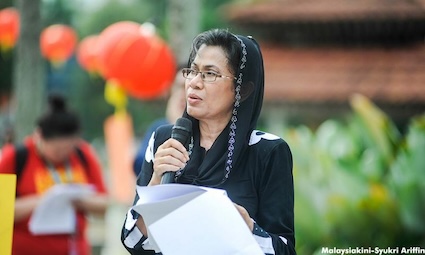Mother-Daughter Duo Challenge ‘Stronger’ Sharia Law

(Eurasia Review) – A Muslim woman and her daughter are challenging amendments to a sharia law made by a state government in 2019, saying they go against the Federal Constitution.
Lawyer Nik Elin Zurina Nik Abdul Rashid and her daughter Tengku Yasmin Natasha Tengku Abdul Rahman said the Kelantan Syariah Criminal Code (I) Enactment 2019 has 20 provisions that are unconstitutional.
They also say that the power to legislate on criminal matters belongs exclusively to parliament, with state assemblies only given the right to enact laws concerning the Islamic faith.
The mother-daughter duo is from Kelantan, the east coast state governed by the conservative Perikatan Nasional (National Alliance). The main component in this coalition is the Malaysian Islamist Party (PAS), whose main goal is to see the establishment of a Malay-Islamic state run according to sharia laws.
There was much hope when the amendments came into force in November 2021. Former chief minister Ahmad Yakob then said: “It is hoped that the enforcement of it will be beneficial in strengthening sharia law, not only in Kelantan but also in other states in Malaysia.”
Kelantan’s ruler Sultan Muhammad V was reported to have said, “I hope the state government views it seriously and strives to strengthen and defend the Syariah Criminal Code to eradicate and prevent the spread of sharia crimes.”
The ruler’s assent is needed for state laws.
There is now fear that the Nik Elin-Natasha case would put a spanner in the works and go the way the Iki Putra Mubarak case did as Federal Court judges then decided that “the primary power of legislation in criminal law resides in parliament.”
PAS-owned media Harakah ran an article last September with the headline “Iki Putra memakukeranda, Nik Elin letak batu nisan” (Iki Putra nails coffin, Nik Elin places tombstone) saying these two cases could destroy the sharia courts in Malaysia.
In 2019, Iki Putra challenged the Selangor Syariah Criminal Enactment 1995 claiming that neither the state nor the sharia court had the jurisdiction to enact and try sodomy cases.
The Federal Court’s nine-judge panel unanimously declared in 2021 that the provision which made unnatural sex a sharia offence was invalid and had gone against the Federal Constitution. Such offences fall under parliament’s powers to make laws and not under state legislatures’ law-making powers.
This is the outcome Kelantan’s Chief Minister Mohd Nassuruddin Daud is trying to avoid. He has gone on the offensive, declaring those who challenged Islamic law in court were in essence challenging the Quran and Hadith, and asking Muslims to pray for a favorable outcome.
“If the petition by this irresponsible person is approved by the court, it will cause a large part of the jurisdiction of the sharia court to be erased,” he said on Nov 13.
To show they walk the talk, Perikatan Nasional is organising a series of demonstrations with the final one in Putrajaya on Nov 20 at the Palace of Justice, which is where and when the Federal Court will resume the Nik Elin-Natasha petition hearing.
Malaysia has a unique situation where the Federal Constitution has divided the areas of law. The state can only legislate on matters involving the precepts of Islam, while civil and criminal law and procedure, and the administration of justice fall under federal jurisdiction.
A report by three NGOs shows that the punishment that can be meted out by the sharia court under Kelantan sharia law went beyond the maximum punishment permitted under the Federal Constitution. The enactment also allows caning as a form of punishment, including against women and children who have reached puberty. Corporal punishment against women is prohibited under the constitution, and as for boys there are restrictions.
There are far more acts deemed as criminal in the Kelantan sharia law and this includes premarital pregnancy, the act of selling or giving away a Muslim child to non-Muslims or a morally reprehensible Muslim, intoxication, and sodomy. Then there is the criminalisation and non-recognition of LGBTQ and gender-diverse persons which under sharia laws extend to all persons regardless of religious backgrounds.
Some of the provisions “clearly intrude on existing federal laws, such as the Penal Code, Dangerous Drugs Act, and various acts related to commercial and banking matters,” says the 2021 report prepared by Sisters in Islam, Justice for Sisters, and Legal Dignity, who are working for advancing the rights of Muslim women and the LGBTIQ community.
“While the enactment is only applied to Muslim persons, it has an extensive impact on all persons in the state of Kelantan,” they maintain.
The criminalisation of premarital pregnancy, drug use, sodomy and sex work will increase barriers for affected communities to seek healthcare services due to fear of being reported. Those who do defy the enactment and offer healthcare, do so under great risk, says the report.
The restrictions on women’s attire can be an unending nightmare for businesses operated and staffed by both Muslims and non-Muslims. There are far too many cases of overzealous religious leaders and officials imposing their beliefs and perspectives on businesses, not just over attire but on other matters too. Like the ban on Swatches by the federal government.
“As the increased fear of Islamisation continues to creep further into the country, none of us will rightly feel at home in Malaysia,” said the KL & Selangor Chinese Assembly Hall when commenting on the amendments. This 100-year-old body is made up of ethnic Chinese clans, associations and chambers of industry and commerce, and is known to be the voice of the Chinese community.
If the mother-daughter duo wins, there may be more petitions against sharia laws in other states. But the win will also strengthen the resolve of religious leaders to bulldoze in parliament an amendment to the Federal Constitution that will pave the way for more and stronger sharia laws.

